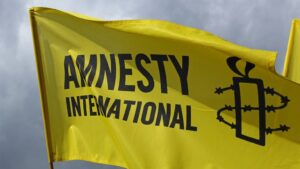President Donald Trump became visibly upset after hearing about a new nickname from Wall Street analysts who’ve been watching his trade moves closely. The nickname, “TACO Trade,” stands for “Trump Always Chickens Out.” It suggests that he often backs away from aggressive tariff threats, which is why investors believe the stock market has been rising.
This reaction came during a short conversation in the Oval Office, just after Jeanine Pirro was sworn in as the interim attorney for Washington, D.C. CNBC’s White House correspondent Megan Casella questioned Trump’s reliability on tariffs, referencing how traders and analysts now expect him to back off whenever he makes strong threats.
Casella asked the president how he felt about the idea that markets were gaining strength because people assumed he wouldn’t follow through with his tariff plans. She cited a recent article by a Financial Times columnist who made this observation.
Trump clearly didn’t like the question. He responded with sarcasm, repeating the “chicken out” phrase and then defending his actions. He explained that he had initially set tariffs on China as high as 145% but later reduced them to 100%, then even lower. According to Trump, this wasn’t backing down—it was part of pushing China to open up its market completely.
He also mentioned a 50% tariff threat he made to the European Union. Trump said EU leaders quickly contacted him after hearing about the tariffs and asked to meet. He gave them until July to make a deal, saying this was a sign of negotiation, not weakness. He then challenged how that could be seen as “chickening out.”
Trump continued defending himself by pointing out that the U.S. economy was in very bad shape just six months earlier. He called the question rude and insisted that changing tariff rates was part of his strategy to get better trade deals, not a sign of fear or retreat.
Back on April 2—what Trump labeled “Liberation Day”—he introduced a 10% base tariff and announced a set of targeted tariffs on nearly every country. However, before they were fully implemented, he paused all of them except the ones on China. Trump said this pause was to give his team time to negotiate quick trade deals, and markets responded positively.
Since then, the U.S. has reached a temporary agreement with China. The deal allows for the highest tariffs to be reduced to about 30% while both sides continue negotiating. Trump said this is a win for the U.S. and proof that his approach is working.
He also drew a comparison between the economy now and when President Biden was in office. Trump claimed that $14 trillion is currently committed for investment, while under Biden, he said, there was almost nothing. He described the U.S. as being in a state of decline before he took action.
Trump went on to share a comment he claimed came from the king of Saudi Arabia. According to Trump, the king said that the U.S. is now “the hottest country in the world” in terms of business and growth.
This week, Trump decided to delay his tariff deadline for the European Union from June 1 to July 9. This extension came after a phone call with EU President Ursula von der Leyen. He had originally threatened a 50% tariff on EU goods but is now giving them more time to work out a deal.
Earlier in his presidency, Trump had already imposed 25% tariffs on cars, aluminum, steel, and imports from Canada and Mexico that didn’t meet USMCA rules. These measures were part of a broader effort to pressure countries into better trade terms.
These tariffs are in addition to the 10% base tariff on all imports and the special 30% tariff on goods from China, which remain part of his ongoing trade strategy.







